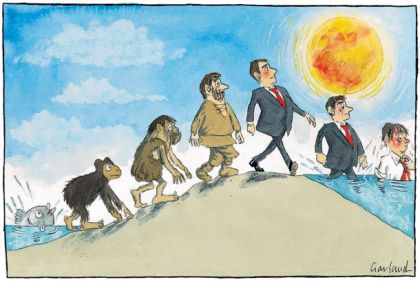 †
†
†[The
Telegraph, U.K.]
Nachrichten,
Switzerland
Scientific Discovery of 2009 Explains the Economic Crash
"This 'all or nothing' way of thinking is an endowment from our hominid ancestors who, living under conditions of constant scarcity, couldn't pass up a chance for a rich bounty. There was simply no such thing as too much food."
By Patrik Etschmayer
Translated By Patrik
Etschmayer
December 21, 2009
Switzerland - Nachrichten - Original Article
(German)
If you find yourself
asking again, why the damned economy has collapsed and who you should blame for it ... I have
a viable candidate. The shabby little chap stood 4 feet tall [1.2 meters],
weighed scarcely 110 pounds [50 kilos] and is well-known among his friends as
ďArdi." But if you hope to get anything back from him now, I'll have to
disappoint you. Not only because his homeland Ethiopia has a notoriously
slow-growth economy, but because Ardi, whose full name is Ardipithecus ramidus,
lived 4.4 million years ago and all that's left of him are a few bones.
In fact, Ardi is considered
the most important scientific discovery of 2009. This tiny, upright-walking
fellow is considered the earliest known ancestor to us and other now-extinct hominids;
he's apparently the long-sought missing link that constitutes the first non-ape
in our lineage.
So why is this little fellow
to blame for the recession - apart from the fact that there would be no humans without
him and no recession without humans? The answer can be found in the environment
within which Ardi lived and the circumstances of his life. They lived (there
was more than one Ardi, of course) in lush forests and nourished themselves on
nuts, fruits and small animals - and their brains were no bigger than a
chimpanzee's.
The status of Ardipithecus in
his environment was that of prey for the ancestors of today's lions and
leopards. Danger was imminent and extremely deadly. Fright and flight were the
immediate reactions to a rustling in the bushes or a movement seen on the edge
of vision between foliage. The pungent scent of cat urine cranked up his
attention quickly, signaling a possible sign of danger nearby.†
When the housing bubble
inexorably inflated, logic dictated that it couldn't go on forever. But for
many, including the experts, the day of reckoning seemed a long way off. The risks
built up slowly. There was no cracking of a branch from the paw of a lion to make
us twitch, warning us off of the looming disaster. Inflated real estate-prices
didn't emit an odor to alert us to the hidden danger.
On an emotional level, we
simply lack the senses that would alert us to such dangers and would trigger
the physical distress necessary to stop us from stirring up such speculation and
distance ourselves from the danger before a critical plunge in prices leads to
blind panic and a crash.†††
Posted by WORLDMEETS.US
And already, absurdly, the
bankers are singing the praises of greed even though we're not even close to overcoming
the crises we're in. It is the proverbial belief that "greed is good."
It's argued that only top money and the chance for a big bonus make possible
the best performance ... yea right! Didn't we just go through that?
Behavioral scientists disagree:
Extreme salaries and bonuses lead to a narrowing of the actors' focus, causing
them to loose sight of long-term self-interest and their own moral values - and not
least because they find themselves in extreme competition with their
co-workers: He who gets a smaller bonus than the next guy sees himself as a looser
and a failure. To prevent this, rules of law and reason are dispensed with - and
with disastrous consequences.
This "all or nothing"
way of thinking is an endowment from our hominid ancestors who, living under
conditions of constant scarcity, couldn't pass up a chance for a rich bounty.
There was simply no such thing as too much food, and there again was Ardi, with
his upright gait and his arms free for the task of walking and gathering food (something
akin to wealth in those days). The presumption is, according to the findings,
(which should only be accepted with caution) that males gathered food, securing
the lives of females and offspring when returning home with their arms full.
When today, predominantly
male traders rake in cash without a thought for the risk, it doesn't occur for the same life-sustaining reasons as ancient times, but according to the same behavioral patterns. We know the results.
Posted by WORLDMEETS.US
But now at least, we know
who's to blame for the whole mess: not the bankers who continue to act like extinct,
4.4 million-year-old, four-foot tall hominids from Ethiopia that had brains a
third the size of our own ... but Ardi, with his pair of nut-and-fruit
gathering arms that invented this behavioral principal for our branch of the
evolutionary tree!
CLICK HERE FOR GERMAN VERSION
Posted by WORLDMEETS.US, Dec. 25, 5:44am